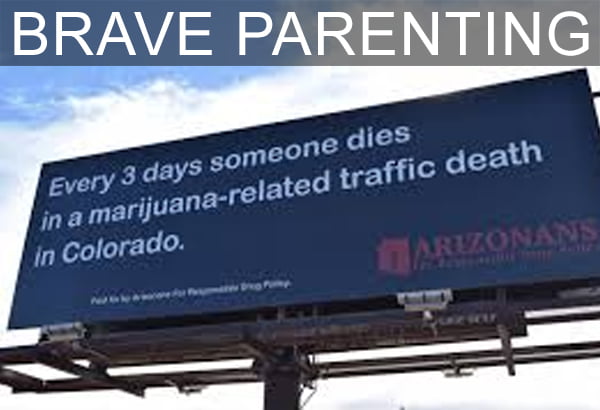Tell Your Children the Truth About Marijuana, Mental Illness, and Violence. (This is Personal to Me.)

This is the title of a book that jumped to the head of my reading list. This topic is very personal to me.
I read on p. XXIX (that would mean it’s in the introduction) this:
“If you were shaking your head before, you’re really shaking it now, I imagine. I don’t blame you. Almost no one—not even the police officers who deal with it every day, not even most psychiatrists—publicly connects marijuana and crime.” –Alex Berenson
I’ve known this. I’ve known this for over 20 years. That is how long my life has been entangled with the prison system because of the boys I’ve raised. Every one of their crimes has involved marijuana. Every one. And nearly every one we have met in prison is also incarcerated because they were high on marijuana.
You would think alcohol would be the more common cause of crime. We know it is not. Studies also say it is not.
We’ve known this. As we’ve been watching this movement of legalizing marijuana we’ve been telling our story. But no one is really listening. We are treated like our story is separate incidents. Maybe this book will help stop the train. This is why it jumped to the head of my reading list. Maybe one of you is in a position to stop the train which is inspiring me to write this.
Maybe you as the parent to your teen can speak the truth to those in your circles—and to your teen.
This is painfully personal to me.
Instead of presenting my case or telling you our sad story, I’m going to bullet-list facts that I’ve come across–with sources. Read the book. Read my list. I think you will become convinced too. My prayer is you will not be able to unsee this.
- “Among American teenagers, the drug’s “daily use has become as, or more, popular than daily cigarette smoking” according to the National Institute of Health’s 2017 Monitoring the Future study. We’ve successfully demonized cigarettes while new laws send kids the message that marijuana is harmless. Yet we’ve known for more than a decade of the link between marijuana and psychosis, depression and schizophrenia.” —New York Post
- “In 2007 the prestigious medical journal Lancet recanted its previous benign view of marijuana, citing studies showing ‘an increase in risk of psychosis of about 40 percent.’” (40%!!!!!!!) —New York Post
- In 2014, The Lancet Psychiatry famously reported that teens who smoke marijuana daily are 60 percent less likely to graduate from high school or college than those who never use — and seven times more likely to attempt suicide. –NBC News
- “Bringing together 11 international studies published from the mid-nineties onwards, the researchers followed the data of 23,000 teenagers right into adulthood. After accounting for other factors at play, the findings reveal cannabis use before 18 years of age increases the chance of developing depression in adulthood by 37 percent.” (37%!!!!!!!) —ScienceAlert.com
- A “BMJ study estimated that ‘13 percent of cases of schizophrenia could be averted if all cannabis use were prevented.’ That’s more than 400,000 Americans who could be saved from a fate worse than death.” –New York Post
- “Youth suicide is at an all-time high and rates of serious mental illness in this country are on the rise, especially among people aged 18 to 25, the cohort most likely to use marijuana.” (You’ve all seen this to be true on social media.) —New York Post
- The Centers for Disease Control and Prevention on August 21, 2019, said 16 states have reported 153 cases of serious respiratory illnesses in people who vape. Most of the patients said they had difficulty breathing and experienced chest pain before going to the hospital, and several also said they used products containing THC, the chemical in marijuana that makes a person high. Officials are trying to get to the bottom of what exactly is causing the illnesses, and are now trying to determine which products were used. The cases were reported from June 28 to August 20, with mostly teenagers and young adults affected. The CDC said it has not received any reports of death linked to the illness. —CNN
- “In 2012, Isaac Campos, a University of Cincinnati professor, wrote a book on the history of Mexican attitudes toward cannabis. The marijuana lobby in the United States portrays the drug war in Mexico as an outgrowth of American drug laws. Legalizers say the United States has exported its prohibitionist attitudes south. The theory sounds good. It’s become conventional wisdom. There’s only one problem. It’s not true. If anything, the opposite is the case. In his meticulously reported history, Home Grown: Marijuana and the Origins of Mexico’s War on Drugs, Campos found that in the late 1800s—a period when few Americans had heard of marijuana—people in Mexico believed it caused mental illness and crime. Mexican newspapers portrayed marijuana users as prone to violence and self-injury.” ––Alex Berenson, Tell Your Children the Truth About Marijuana, Mental Illness, and Violence, p. 4
- Many of us baby boomers believe that today’s cannabis is what was smoked in the 1970s. False. “Through the mid-1970s, most marijuana consumed in the United States contained less than 2% THC. …Marijuana sold at legal dispensaries now routinely contains 25% THC.” –Alex Berenson, Tell Your Children the Truth About Marijuana, Mental Illness, and Violence, p. XIX
- “CBD isn’t cannabis. It’s one chemical in marijuana out of many. And unlike THC, CBD doesn’t activate the CB1 brain receptor. Whether or not CBD helps psychosis has nothing to do with whether THC worsens it. Finally, it bears repeating that nearly all marijuana sold today contains high levels of THC and almost no CBD. –Alex Berenson, Tell Your Children the Truth About Marijuana, Mental Illness, and Violence, p. 103
- “Immediately following commercialization in Colorado, calls to poison centers skyrocketed 80%, because high-potency THC is a dangerous drug.” –New York Post
- “Traffic fatalities that involved drivers intoxicated with marijuana in Colorado rose by 86% between 2013 and 2017, with roughly one-fifth of all traffic fatalities involving a driver testing positive for marijuana by 2017.” —New York Post
- “The idea (legal medical marijuana) appealed to Americans’ sense of compassion: if marijuana could help sick people, why shouldn’t they have it? …Even now, doctors cannot prescribe marijuana, because the FDA has never approved cannabis to treat any medical condition. Marijuana simply isn’t a prescription drug in the way that physicians use the term.” –Alex Berenson, Tell Your Children the Truth About Marijuana, Mental Illness, and Violence, p. 69
- “In its 2017 report, NAM (National Academy of Medicine) found essentially no evidence that cannabis or cannabinoids can help cancer of any kind. Worse, it found some evidence that cannabis use is associated with testicular cancer—and that mothers who smoke are more likely to have children who develop leukemias and brain cancer. …The National Academy’s report also found no evidence that cannabis is useful for a whole alphabet of diseases it’s supposed to help: dementia, epilepsy, glaucoma, irritable bowel syndrome, ALS, or Parkinson’s disease. It found almost no evidence that marijuana can treat anxiety or posttraumatic stress disorder—and some evidence that the drug worsens these conditions.” ––Alex Berenson, Tell Your Children the Truth About Marijuana, Mental Illness, and Violence, p. 75
- I know of teens who’s parents are buying them cannabis or cannabis products to help them with their ADHD or PTSD. I am a witness that this has not helped and it has worsened their lives. –Brenda Seefeldt Amodea
- The Legalization lobbyists “claims high-potency commercial weed will provide social justice and economic opportunity for minority communities. …Remember when liquor stores and smoke shops were clustered in largely low-income and minority neighborhoods? Pot shops selling high-potency drugs engineered to create regular customers won’t lead to any more empowerment and opportunity for urban populations than clustered vice stores did.” —New York Post
- “There has been no quantifiable positive economic impact for such communities in legalized states. In fact, taxpayers and communities have had to shoulder an estimated $4.50 in social costs for every $1 in revenue, according to researchers at the Centennial Institute.” —New York Post
- “The pot industry wants people to think that marijuana laws are the cause of gross racial disparities in arrest and incarceration rates. The argument: Legalize pot to reduce minority arrests. That’s another canard. No state that passed legalization has seen a drop in prison populations. Studies out of Colorado and Washington show African Americans and Hispanics are still twice as likely to be arrested for marijuana. In Washington, DC, marijuana arrests nearly tripled after legalization.” —New York Post
- There is a convincing link of marijuana use and the mass killers from James Holmes, the Aurora, Colorado movie theatre shooter, to Dylann Roof, the Charleston Emanuel Church shooter, to Connor Betts, the Dayton, Ohio shooter. “A 2018 FBI reports that 40% of “active shooters” in the US between 2008 and 2013 had been diagnosed with a mental illness before the attack and 70% had “mental health stressors” or “mental health concerning behaviors.” —New York Post
- “The researchers said the results suggested that, if cannabis use were eliminated, there would be an estimated 400,000 fewer cases of depression in 18 to 34 year olds in the United States. …’It’s a big public health and mental health problem,’ Cipriani told reporters at a briefing in London. ‘Adolescents should be made aware of the risk.’” —Reuters News
- “Altria, which is facing a global fall in tobacco sales as consumers abandon cigarettes, has perhaps the most to gain from entering the industry. ‘Tobacco has been experiencing year-over-year declines,’ said Ms. Gomez. ‘They need something else to go into.’ And the company’s experience manufacturing and distributing cigarettes makes it well positioned to make these products on a mass-market scale.” —New York Times
- Greed is at the root of legalization of marijuana. We have greedy governments looking to tax this. We have greedy business people looking to make profits. We have Big Tobacco paying the lobbyists to promote legalization. And Big Tobacco has never lied to us, right? Big Tobacco needs to find new profits, right? Greed is evil and cares nothing about the teen brain or the teen soul. –Brenda Seefeldt Amodea
You can use your Google machine yourself and read more.
I pray you can’t unsee this.
Addition: Why are we legalizing this when the science is coming in as so damaging? Problems persist for kids exposed to cannabis in the womb.
Addition 2: Researchers found that risk of coronary heart disease, heart attack and stroke increased with any kind of cannabis use, with heavier use associated with higher odds of negative outcomes. For daily cannabis users, for example, odds of a heart attack were 25% higher compared to non-users and 42% higher for stroke. Source. Tell me again how this is good for us.
(photo credit:
https://www.phoenixnewtimes.com/news/anti-marijuana-group-strikes-back-in-pot-billboard-battle-9949561)
Comments
Trackbacks & Pingbacks
[…] we are legalizing marijuana. (I have strong thoughts about that.) Teens and young adults are having less sex but only because of the increase of porn, […]






Brenda!
Link sent to me from a friend of Bravester: Snooty Emily Post Institute has created etiquette for marijuana use. https://fortune.com/longform/cannabis-etiquette-dos-and-dont
Can I grieve and be furious at the same time?